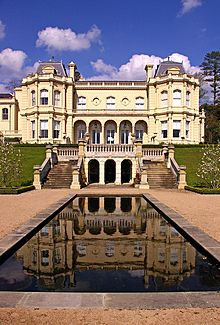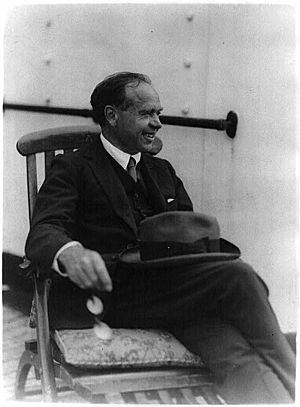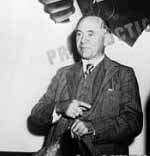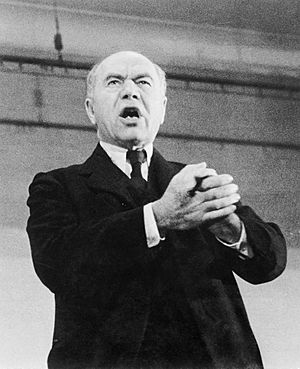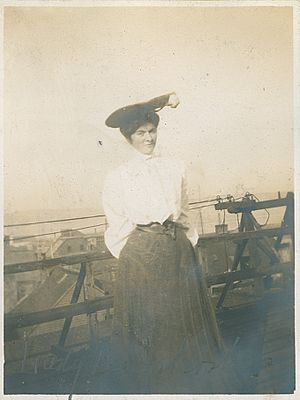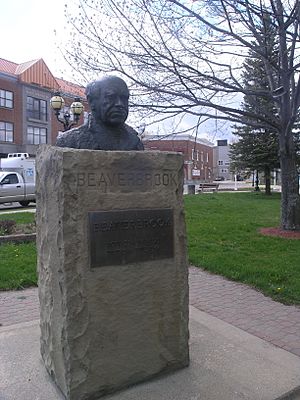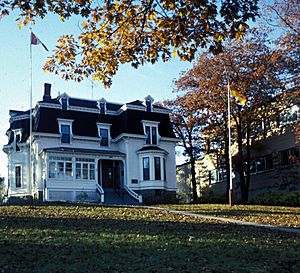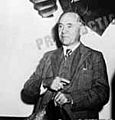Max Aitken, 1st Baron Beaverbrook facts for kids
Quick facts for kids
The Lord Beaverbrook
PC ONB
|
|
|---|---|
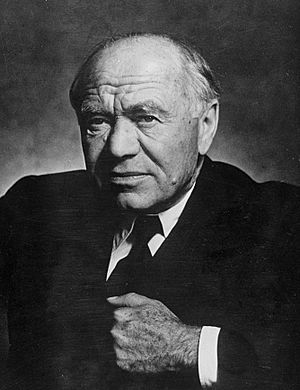
Lord Beaverbrook in 1943
|
|
| Lord Keeper of the Privy Seal | |
| In office 24 September 1943 – 27 July 1945 |
|
| Prime Minister | Winston Churchill |
| Preceded by | Viscount Cranborne |
| Succeeded by | Arthur Greenwood |
| Minister of War Production | |
| In office 4 February 1942 – 19 February 1942 |
|
| Prime Minister | Winston Churchill |
| Preceded by | Office created |
| Succeeded by | Oliver Lyttelton (as Minister of Production) |
| Minister of Supply | |
| In office 29 June 1941 – 4 February 1942 |
|
| Prime Minister | Winston Churchill |
| Preceded by | Sir Andrew Duncan |
| Succeeded by | Sir Andrew Duncan |
| Minister of Aircraft Production | |
| In office 14 May 1940 – 1 May 1941 |
|
| Prime Minister | Winston Churchill |
| Preceded by | Office created |
| Succeeded by | John Moore-Brabazon |
| Minister of Information | |
| In office 10 February 1918 – 4 November 1918 |
|
| Prime Minister | David Lloyd George |
| Preceded by | Office created |
| Succeeded by | The Lord Downham |
| Chancellor of the Duchy of Lancaster | |
| In office 10 February 1918 – 4 November 1918 |
|
| Prime Minister | David Lloyd George |
| Preceded by | Sir Frederick Cawley |
| Succeeded by | The Lord Downham |
| Member of the House of Lords Lord Temporal |
|
| In office 2 January 1917 – 9 June 1964 Hereditary peerage |
|
| Preceded by | Peerage created |
| Succeeded by | The 2nd Lord Beaverbrook |
| Member of Parliament for Ashton under Lyne |
|
| In office 3 December 1910 – 23 December 1916 |
|
| Preceded by | Alfred Scott |
| Succeeded by | Albert Stanley |
| Personal details | |
| Born |
William Maxwell Aitken
25 May 1879 Maple, Ontario, Canada |
| Died | 9 June 1964 (aged 85) Leatherhead, Surrey, England |
| Political party |
|
| Spouses |
Gladys Henderson Drury
(m. 1906; died 1927)Marcia Anastasia Christoforides
(m. 1963) |
| Children |
|
| Residences | Cherkley Court, Leatherhead, Surrey, England |
| Occupation | Legislator, author, entrepreneur |
William Maxwell Aitken, 1st Baron Beaverbrook (born May 25, 1879 – died June 9, 1964), usually known as Lord Beaverbrook, was a very important Canadian-British newspaper owner and politician. He was a powerful person in British news and government during the first half of the 1900s. He owned the Daily Express, which was the biggest newspaper in the world at one point. It was popular with working-class people because it had very patriotic news. During World War II, he played a big part in getting factories to produce what was needed as Winston Churchill's Minister of Aircraft Production.
Max Aitken was good at making money from a young age. He became a millionaire by the time he was 30. He moved to Britain because he wanted to do even bigger business deals. There, he became friends with Bonar Law and won a seat in the British Parliament in 1910. He was knighted soon after. During World War I, he helped record Canadian war efforts. He also helped remove H. H. Asquith as prime minister in 1916. The new government, led by David Lloyd George, made Aitken a lord and briefly a government minister.
After the war, Lord Beaverbrook focused on his newspapers. He made the Daily Express incredibly successful, selling over 2 million copies a day. He used his newspaper to push for his ideas, like making the British Empire a free trade area. He supported the governments of Stanley Baldwin and Neville Chamberlain in the 1930s. When World War II started, his friend Winston Churchill asked him to be the Minister of Aircraft Production in May 1940. Churchill later said he had "vital and vibrant energy." Beaverbrook resigned in 1941 due to health issues but later served as Lord Privy Seal.
In his later life, Beaverbrook continued to run his newspapers, which included the Evening Standard and the Sunday Express. He also became the head of the University of New Brunswick and wrote several books about history.
Contents
- Early Life and Education
- Starting a Business Career
- Moving to Britain and Entering Politics
- World War I Efforts
- Newspaper Empire Builder
- "Empire Isolationism" and Appeasement Policies
- World War II Contributions
- Later Life and Legacy
- Family Life
- Historian and Author
- Death and Memorials
- What He Left Behind
- Images for kids
- See also
Early Life and Education
Max Aitken was born in Maple, Ontario, Canada, in 1879. He was one of ten children. His father, William Cuthbert Aitken, was a minister from Scotland. His mother, Jane Noble, was the daughter of a successful farmer. When Max was one year old, his family moved to Newcastle, New Brunswick. He always thought of Newcastle as his hometown.
When he was 13, he started a school newspaper called The Leader. He also delivered newspapers and worked as a local reporter for the St John Daily Star.
Aitken tried to get into Dalhousie University but was not accepted because he skipped some exams. He then started at King's College Law School but left soon after. This was the only higher education he had. He worked in a shop, sold life insurance, and collected debts. He even worked for a short time in the law office of R. B. Bennett, who later became a Canadian prime minister.
Starting a Business Career
In 1900, Aitken moved to Halifax, Nova Scotia. There, John F. Stairs, a well-known businessman, hired him and taught him about finance. In 1904, Stairs started the Royal Securities Corporation, and Aitken became a part-owner and the general manager. Aitken made many successful business deals.
When Stairs died in 1904, Aitken took control of the company and moved to Montreal, which was Canada's business center. He bought and sold companies, invested in stocks, and had business interests in Cuba and Puerto Rico. He started a magazine called the Canadian Century in 1910. He also invested in the Montreal Herald and almost bought the Montreal Gazette. In 1907, he started the Montreal Engineering Company. In 1909, he founded the Calgary Power Company Limited, now called TransAlta Corporation. He oversaw the building of the Horseshoe Falls hydro station.
Between 1910 and 1911, Aitken bought several small cement factories in Canada. He combined them into Canada Cement, which controlled most of the cement production in Canada. Canada's economy was growing fast, and Aitken had a near-monopoly on cement. He sold his shares and made a lot of money.
Aitken first visited Britain in 1908. In 1910, he returned to raise money for a steel company and decided to stay. Before moving permanently, he helped combine smaller steel companies into the Steel Company of Canada, mostly with British money. Soon after, he moved his family to the UK.
Moving to Britain and Entering Politics
In 1910, Aitken moved to Britain. He became good friends with Bonar Law, who was also from New Brunswick and later became the only Canadian to be Prime Minister of the United Kingdom. They had a lot in common, both being successful businessmen. Aitken convinced Bonar Law to support him in running for the Unionist Party in the December 1910 election. Aitken was a great organizer and spent a lot of money on advertising. He won the election by a small number of votes.
Aitken did not speak much in Parliament. However, he promised a lot of money to the Unionist Party. In 1911, King George V made him a knight. Aitken's political power grew when Bonar Law became the leader of the Unionist party in 1911. Aitken wanted to create a trade system where countries in the British Empire traded freely with each other, but put taxes on goods from outside the Empire. This idea was not popular with everyone because it could make food prices higher.
In 1911, Aitken strongly opposed a trade agreement between Canada and the United States. He believed it would lead to the U.S. taking over Canada. So, he went back to Canada to campaign for the Conservatives. He even got his friend Rudyard Kipling to write an article for Canadian newspapers. Kipling's article warned Canadians that their country's identity was at risk. This article was very popular and helped the Conservatives win the election.
Aitken bought Cherkley Court near Leatherhead and hosted many important people there. In 1913, his house was even used for talks between Bonar Law and Prime Minister H.H. Asquith about Irish home rule.
While in Parliament, Aitken continued to expand his business. He also started building a newspaper empire in Britain. In 1911, he secretly invested in the struggling Daily Express. He also gained control of another London newspaper, The Globe. In 1916, he secretly bought a controlling share of the Daily Express.
World War I Efforts
During the First World War, Aitken showed his excellent organizing skills. He hired artists, photographers, and filmmakers to record life on the Western Front. He also created the Canadian War Memorials Fund, which collected artworks by famous British and Canadian artists. He helped create the Canadian War Records Office in London and made sure stories about Canadian soldiers appeared in newspapers.
Aitken visited the Western Front as an honorary colonel in the Canadian Army. His experiences led to his 1916 book, Canada in Flanders, which told the stories of Canadian soldiers. He also wrote other books after the war. While British journalists faced strict censorship, Aitken's "Eyewitness" reports from the front made him famous in Canada.
Aitken became unhappy with Prime Minister H. H. Asquith, believing he was not managing the war well. Aitken was also upset when he did not get a government job in 1915. After the failure of the Dardanelles campaign, Winston Churchill lost his job. Aitken visited Churchill to offer support, and they became close friends.
Aitken played a small part in helping David Lloyd George replace Asquith as prime minister in December 1916. Lloyd George offered Aitken a government position, but Aitken had to resign his seat in Parliament and run in a special election. Instead, Aitken arranged for his friend Albert Stanley to take his seat. In return, Aitken was made a lord on January 23, 1917, becoming the 1st Baron Beaverbrook. He chose the name "Beaverbrook" from a small community near his childhood home in New Brunswick.
In 1917, it became public that Beaverbrook controlled the Daily Express. Some members of the Conservative Party criticized him for owning a newspaper they thought was irresponsible.
In February 1918, Beaverbrook became the first minister of the new Ministry of Information. He was also made Chancellor of the Duchy of Lancaster and joined the Privy Council. He was in charge of propaganda in Allied and neutral countries. Beaverbrook often argued with the Foreign Secretary, Arthur Balfour, about using intelligence information. He resigned in October 1918 due to illness.
Historian A. J. P. Taylor later said that Beaverbrook was a pioneer. He "invented all the methods of publicity" Britain used to promote the war. This included hiring the first war artists, photographers, and filmmakers. He was very good at encouraging people to buy war bonds. However, many politicians disliked him because they were suspicious of powerful newspaper owners.
Newspaper Empire Builder
After World War I, Beaverbrook focused on the Daily Express. He changed it from a boring newspaper into an exciting one with a positive attitude and dramatic photos. He hired talented writers and cartoonists. He also used new printing technology. In 1919, the Daily Express sold less than 40,000 copies a day. By 1937, it sold over 2.3 million copies, making it the most successful British newspaper and earning Beaverbrook huge profits. After World War II, it became the largest-selling newspaper in the world. Beaverbrook also started the Sunday Express in 1918 and, in 1923, bought the Evening Standard with Lord Rothermere.
By 1937, Beaverbrook and three other newspaper owners controlled almost half of all national and local daily papers sold in Britain. Their newspapers sold over thirteen million copies combined.
Beaverbrook owned The Vineyard, Fulham, a small house in London, where he held secret political meetings. He also entertained many powerful friends at his home, Cherkley Court. These friends included Churchill, Lloyd George, and other important figures.
Beaverbrook, often called the "first baron of Fleet Street" (where many newspapers were based), was seen as very powerful. People thought his newspapers could make or break almost anyone. He enjoyed using his papers to attack his opponents and support his friends. From 1919 to 1922, he used his papers to criticize David Lloyd George's government.
He was a charming and energetic man, but many in the British elite did not trust him. He was known for being a demanding boss. He had telephones in every room of his house so he could call his editors at any time. Beaverbrook believed in "independence," which meant he felt free to criticize his allies in his newspapers.
Although a Conservative, Beaverbrook opposed Britain getting involved in the Russian Civil War. He used his newspapers to argue that it was not Britain's business who ruled Russia. For example, in 1919, the Daily Express ran a headline saying "ARCHANGEL SCANDAL EXPOSED" and attacked Churchill's policy in Russia. In 1920, Beaverbrook also opposed British aid to Poland during the Soviet-Polish war.
Beaverbrook used the Daily Express to link the Labour Party with the Soviet Union in the 1924 election. His newspaper's cartoons often showed Communists as dirty and unkempt.
In foreign policy, Beaverbrook promoted "empire isolationism". This meant Britain should focus only on its empire and stay out of other world affairs. His newspapers often said Britain was not a European nation and should avoid European problems. He was against Britain joining the League of Nations. In 1923, he even suggested giving up the Palestine Mandate because he thought it was a burden. He believed the British Empire was the greatest force for good in the world.
Beaverbrook thought that the British Dominions (like Canada and Australia) were as important as Britain itself. He wanted to end all trade barriers within the Commonwealth and put taxes on products from outside the Commonwealth. He called this the Empire Free Trade zone. Historian A. J. P. Taylor said Beaverbrook's Canadian background influenced these ideas.
Beaverbrook disliked Stanley Baldwin's leadership of the Conservative Party. In 1929, he started the Empire Free Trade Crusade movement to push for his "Empire Free Trade zone." This movement gained some support. In 1930, Beaverbrook and Lord Rothermere even started the United Empire Party. However, the movement eventually lost its power as an election force.
"Empire Isolationism" and Appeasement Policies
In March 1933, Beaverbrook visited Germany. He wrote that stories of Jewish persecution seemed "exaggerated." He initially thought the Nazis were not very serious. However, after the Night of the Long Knives, he became strongly anti-Hitler, comparing him to gangsters. Beaverbrook's views on Hitler changed several times.
In 1935, Beaverbrook explained his "Isolationist" views. He believed Britain should only make alliances with the United States and avoid other responsibilities outside the Empire. He supported building up the Royal Air Force and Royal Navy, but not the British Army. He campaigned against the Peace Ballot, which was a public vote on supporting the League of Nations. He feared it would drag Britain into wars that did not concern it. He told his readers to "Tear up the ballot paper. Turn away from Europe. Stand by the Empire and Splendid Isolation."
During the crisis when Italy attacked Ethiopia, Beaverbrook opposed sanctions on Italy. He argued that the war did not concern Britain. When Germany remilitarized the Rhineland in 1936, Beaverbrook used his newspapers to argue against Britain taking action. He maintained good relations with Ivan Maisky, the Soviet ambassador in London. In 1936, he attended the Berlin Olympics at the invitation of Joachim von Ribbentrop, the German ambassador.
In the 1930s, Beaverbrook's newspapers reported on the affair between King Edward VIII and Wallis Simpson. He also used the Daily Express to promote British neutrality. For example, he compared supporting the Spanish Republic to supporting the losing side in the Russian Civil War. In 1936, the Daily Express published an article by Lloyd George, who called Hitler "the George Washington of Germany." Beaverbrook published it but said he was embarrassed by it.
Regarding the Sino-Japanese War, Beaverbrook worried about a Japanese threat to the British Empire. In 1938, he warned that Japan was getting "dangerously near other empires." He supported the Munich Agreement and hoped the new Duke of Windsor would seek peace with Germany.
In the late 1930s, Beaverbrook used his newspapers to support the appeasement policies of the Chamberlain government. The Daily Express used the slogan "No War This Year." During the Sudetenland crisis, Beaverbrook wrote, "...do not get caught up in quarrels over foreign boundaries that do not concern you." He strongly opposed Chamberlain's promise to defend Poland in March 1939, arguing Britain had no interest in Poland. On August 7, 1939, the Daily Express ran a headline saying "No War This Year," predicting the Danzig crisis would be solved peacefully.
World War II Contributions
Even though Beaverbrook did not want Britain to declare war on Germany in September 1939, his newspapers took a very patriotic stance. They supported the war effort because he knew most of his readers did. In May 1940, his friend Winston Churchill, the British Prime Minister, made Beaverbrook the Minister of Aircraft Production. Beaverbrook was given almost complete control over making aircraft.
In June 1940, Beaverbrook went with Churchill on a mission to France to try and keep France in the war. Beaverbrook was not as concerned as Churchill about France being defeated. He felt Britain still had its Commonwealth and empire. The plan for an Anglo-French union failed.
With Churchill's support, Beaverbrook completely changed how wartime aircraft were made. He increased production goals by 15%, took control of aircraft repairs, and replaced managers of factories that were not doing well. He also released German Jewish engineers from internment to work in the factories. He often took materials meant for other departments, which caused arguments with the Air Ministry. Beaverbrook did not accept excuses about supply "bottlenecks." He demanded daily lists of problems and made it his job to fix them. One of his first actions was to order the recycling of all wrecked aircraft. From two wrecked planes, a new one could be made. His famous appeal for pots and pans to "make Spitfires" was later revealed to be a propaganda trick. Still, Time Magazine said that if Britain survived, it would be Beaverbrook's triumph.
Under Beaverbrook, the production of fighter and bomber planes increased greatly. Churchill said, "His personal force and genius made this Aitken's finest hour." While some argue that aircraft production was already rising, Beaverbrook certainly boosted it when it was most needed. Air Chief Marshal Lord Dowding, head of Fighter Command during the Battle of Britain, said Beaverbrook "gave us those machines, and I do not believe that I exaggerate when I say that no other man in England could have done so."
Royal Marine General Leslie Hollis remembered Beaverbrook as a "ruthless, cut-throat, steam-roller" leader who was both feared and respected. He was very quick to fire people he thought were inefficient. Hollis also noted that Beaverbrook's friendship with Churchill was "quite stormy," with them often arguing and then making up.
Beaverbrook resigned in April 1941. After a month as Minister of State, Churchill made him Minister of Supply. Here, he argued with Ernest Bevin over responsibilities. On May 10, 1941, Rudolf Hess flew to Scotland to try and arrange peace talks. Beaverbrook was sent to interview Hess. He reported to Churchill that Hess was very strange and believed the war was a mistake. Hess said Germany was about to invade the Soviet Union and that Britain and Germany should unite against the Soviets.
Hess's prediction came true on June 22, 1941, when Germany invaded the Soviet Union. In 1941, Beaverbrook led the British team to Moscow with his American counterpart Averell Harriman. This was the first time a senior British politician met Soviet leader Joseph Stalin since the invasion. Harriman said Beaverbrook was a "great salesman." Beaverbrook liked Stalin, finding him to be a man who preferred action over long meetings.
Impressed by Stalin and the Soviet people's sacrifice, Beaverbrook returned to London determined to convince Churchill to open a second front in Europe. This would draw German forces away from the Eastern Front and help the Soviets. In February 1942, Beaverbrook became Minister of War Production but resigned after only twelve days due to more clashes with Bevin. In September 1943, he was made Lord Privy Seal and held that job until the end of the war.
After leaving the War Cabinet, Beaverbrook became the main supporter of the "Second Front Now" campaign, calling for an Anglo-American invasion of France. This disagreed with Churchill, who preferred bombing Germany and fighting in North Africa and Italy. Despite their differences, Beaverbrook remained a close friend of Churchill throughout the war. Clement Attlee said that "Churchill often listened to Beaverbrook's advice but was too sensible to take it."
Beaverbrook also led the Anglo-American Combined Raw Materials Board from 1942 to 1945. He went with Churchill to several meetings with President Roosevelt. He became close to Roosevelt, which sometimes annoyed Churchill.
Later Life and Legacy
Beaverbrook strongly supported Churchill's campaign in the 1945 United Kingdom general election. However, a Daily Express headline that warned a Labour victory would be like the 'Gestapo in Britain' was a big mistake and did not match what the public felt. Beaverbrook gave up his British citizenship and left the Conservative Party in 1951. He remained loyal to the Empire his whole life.
In 1947, Beaverbrook strongly opposed the plan to give India independence and divide it into India and Pakistan. He blamed Louis Mountbatten, the last Viceroy, for this decision. The Daily Express wrote that Mountbatten and Jawaharlal Nehru were "dangerous enemies." Beaverbrook never forgave Mountbatten and continued to criticize him in his newspapers.
During the Cold War, Beaverbrook hoped that the wartime alliance of the Soviet Union, the United States, and the United Kingdom would continue. It was only after the Berlin blockade in 1948 that the Daily Express took an anti-Soviet stance. However, he still hoped that the Cold War would not last forever.
Beaverbrook used his newspapers to campaign against Mountbatten becoming First Sea Lord, arguing that he "gave away" India. When Mountbatten got the job, Beaverbrook's newspapers tried to make the Royal Navy look bad under his leadership.
In 1956, Beaverbrook used the Daily Express to call for war against Egypt after President Gamal Abdel Nasser took control of the Suez Canal. Beaverbrook saw this as unacceptable. When the invasion of Egypt began, the Daily Express supported it. Beaverbrook saw the end of the Suez crisis, with Britain forced to withdraw, as a national humiliation. Much of his later anti-American feelings came from this event. He also supported keeping Cyprus as a British colony.
Aitken continued to live a very rich life. He traveled on luxurious ships and yachts with many servants and friends. He was known for helping friends in trouble. A.J.P. Taylor called him "a foul-weather friend."
He was against Britain taking loans from America after the war and against Britain joining the European Economic Community (now the European Union) in 1961. In 1953, he became the permanent head of the University of New Brunswick. In 1960, the Daily Express was selling 4.3 million copies a day, making it Britain's most popular newspaper.
He became the university's biggest supporter, providing new buildings, scholarships, the Beaverbrook Art Gallery, and other projects. He bought the historical papers of Bonar Law and David Lloyd George and placed them in the Beaverbrook Library. Beaverbrook was always proud of his roots in New Brunswick.
Family Life
On January 29, 1906, in Halifax, Aitken married Gladys Henderson Drury. They had three children before she died on December 1, 1927. Their son, Max Aitken Jr., became a fighter pilot in World War II. Their daughter, Janet Gladys Aitken, married Ian Campbell, who later became the 11th Duke of Argyll.
Beaverbrook remained a widower for many years. In 1963, he married Marcia Anastasia Christoforides, the widow of his friend Sir James Dunn.
Historian and Author
After World War I, Beaverbrook wrote Politicians and the Press in 1925, and Politicians and the War in two volumes (1928 and 1932). When first published, historians mostly ignored these books. However, when a combined edition of Politicians and the War came out, reviews were more positive. A. J. P. Taylor said it was "Tacitus and Aubrey rolled into one."
Taylor later said the book was very important for understanding events during a major political crisis. He praised its descriptions of political leaders during wartime and its lively writing style.
Beaverbrook also published Men and Power 1917–1918 in 1956. This book was divided into separate stories about different men. It received good reviews and sold many copies.
When The Decline and Fall of Lloyd George was published in 1963, it also received positive reviews from many important people.
Beaverbrook was both admired and disliked. In his 1956 autobiography, David Low quoted H.G. Wells as saying about Beaverbrook: "If ever Max ever gets to Heaven, he won't last long. He will be chucked out for trying to pull off a merger between Heaven and Hell..."
Beaverbrook had strong imperialist views. He once said, "There are countries so underdeveloped today that the gift of independence is like the gift of a razor to a child."
Death and Memorials
Lord Beaverbrook died in Leatherhead in 1964, at the age of 85. He had been suffering from cancer.
A statue of him by Oscar Nemon stands in the park in Newcastle, New Brunswick, near where he sold newspapers as a boy. His ashes are placed in the base of the statue.
The Beaverbrook Foundation continues his charity work. In 1957, a bronze statue of Lord Beaverbrook was put up in Fredericton, New Brunswick. Children from across the province raised money for it.
What He Left Behind
Beaverbrook and his wife left many important gifts to New Brunswick and the United Kingdom. In 2014, he was named a National Historic Person in Canada. His legacy includes many buildings and places:
- University of New Brunswick
- Aitken House
- Aitken University Centre
- Lady Beaverbrook Gymnasium
- Lady Beaverbrook Residence
- Beaverbrook House (UNBSJ E-Commerce Centre)
- City of Fredericton, New Brunswick
- Lady Beaverbrook Arena
- The Beaverbrook Art Gallery, with a famous art collection
- The Fredericton Playhouse
- Lord Beaverbrook Hotel
- Lord Beaverbrook statue in Officer's Square
- City of Miramichi, New Brunswick
- Max Aitken Academy
- Lord Beaverbrook Arena (LBA)
- Beaverbrook Kin Centre (formerly the Beaverbrook Theatre and Town Hall)
- Beaverbrook House (his boyhood home)
- Lord Beaverbrook bust in Queen Elizabeth Park
- Aitken Avenue
- City of Campbellton, New Brunswick
- Lord Beaverbrook School
- City of Saint John, New Brunswick
- Lord Beaverbrook Rink
- City of Ottawa, Ontario
- Beaverbrook (a neighborhood)
- City of Calgary, Alberta
- Lord Beaverbrook High School
- McGill University
- The Beaverbrook Chair in Ethics, Media and Communications
Books by Beaverbrook
- Canada in Flanders (1916)
- Success (1922)
- Politicians and the Press (1925)
- Politicians and the War, Vol. 1. (1928)
- Politicians and the War, Vol. 2. (1932)
- The Resources of The British Empire (1934)
- Why Didn't you Help the Finns? Are you in the Hands of the Jews? And 10 Questions, Answers (1939)
- Spirit of the Soviet Union (1942)
- Don't Trust to Luck (1954)
- The Three Keys to Success (1956)
- Men and Power, 1917–1918 (1956)
- Friends: Sixty years of Intimate personal relations with Richard Bedford Bennett (1959)
- Courage, The Story of Sir James Dunn (1961)
- My Early Life (1962)
- The Divine Propagandist (1962)
- The Decline and Fall of Lloyd George: And Great Was the Fall Thereof (1963)
- The Abdication of Edward VIII (1966)
Images for kids
See also
 In Spanish: William Maxwell Aitken para niños
In Spanish: William Maxwell Aitken para niños
 | Delilah Pierce |
 | Gordon Parks |
 | Augusta Savage |
 | Charles Ethan Porter |


